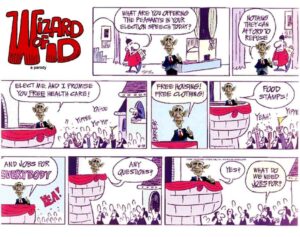by Dan Mitchell

During the Obama years, I shared a cartoon strip that cleverly makes the point that some people will choose not to work if they can get enough goodies from the government.
That Wizard-of-Id parody has been viewed more than 56,000 times, which suggests many readers also thought it was worth sharing.
But it obviously hasn’t been shared often enough with the crowd in Washington. Politicians have created a welfare state that penalizes work and rewards dependency.
Especially now that there are bonus payments for staying unemployed. Which makes it hard to businesses to find workers.
Our friends on the left, however, think there’s a solution to this problem.
In his column for the New York Times, David Leonhardt says there is not a labor shortage because employers can simply raise wages.
The idea that the United States suffers from a labor shortage is fast becoming conventional wisdom. But before you accept the idea, it’s worth taking a few minutes to think it through. Once you do, you may realize that the labor shortage is more myth than reality. …one of the beauties of capitalism is its mechanism for dealing with shortages. In a communist system, people must wait in long lines when there is more demand than supply for an item. That’s an actual shortage. In a capitalist economy, however, there is a ready solution. …When a company is struggling to find enough labor, it can solve the problem by offering to pay a higher price for that labor — also known as higher wages. More workers will then enter the labor market. Suddenly, the labor shortage will be no more. …Sure enough, some companies have responded to the alleged labor shortage by doing exactly this. …companies that have recently announced pay increases include Amazon, Chipotle, Costco, McDonald’s, Walmart, J.P. Morgan Chase and Sheetz convenience stores.
Leonhardt is correct that businesses can lure workers back into the job market by boosting wages. I’m glad he recognizes how the price system works.
But he completely ignores the issue of whether some jobs will simply disappear because they’re not worth the amount of money that would be required to out-compete government handouts.
That’s the key argument from the Wall Street Journal‘s editorial on the topic.
…the U.S. labor market turned in its second disappointing result in a row in May, according to Friday’s Labor Department report. That’s what happens when government pays Americans not to work. Employers created 559,000 net new jobs in the month, which sounds great until you notice that 1.5 million fewer workers in May said they were unable to work because their employer closed or lost business due to the pandemic. …The civilian labor force shrank in May by 53,000, and the number of men over age 20 who were employed fell by 8,000. …What gives? The Occam’s razor explanation is that in March the Biden Administration and Congress ladled out another mountain of cash to Americans—work not required. The extra $300 a week in enhanced jobless benefits is one problem, since millions of Americans can make more staying on the couch. …This is on top of regular jobless benefits, plus new or extended cash payments such as the $3,000 per child tax credit, additional ObamaCare subsidies, and the $1,400 checks to individuals. Again, no work required.
For all intents and purposes, politicians in DC have been undoing the great achievement of welfare reform. That 1996 law was designed to push people from idleness into employment, and it was largely successful.
But over the past couple of decades, laws like Obamacare have given people goodies without any conditionality, which has resulted in many people deciding once again that they don’t need to work.
And if Biden’s per-child handouts are made permanent, expect the problem to get even worse.
Since we started with a cartoon, let’s close with another cartoon.
This gem from Henry Payne captures the problem facing many small businesses.
Big companies have enough financial depth that they can adapt. They have considerable ability to get rid of low-skilled jobs, invest in labor-saving technologies, and even give some raises to employees they retain.
Many small businesses, however, are simply out of luck. That’s one group of victims.
The other victims are the people who get goodies from politicians. Yes, the various handouts make their lives easier in the short run, but once they get trapped in the quicksand of government dependency, it’s very difficult to escape.
P.S. Because he said some sensible things about “basic income” back in 2017, I had hoped Biden would be better on this issue. I should have known better based on his track record.


